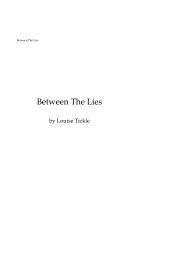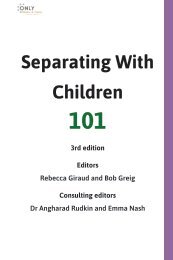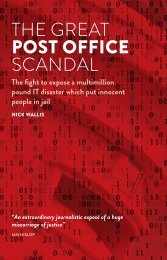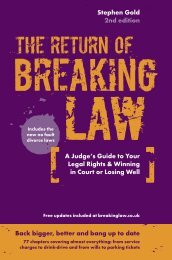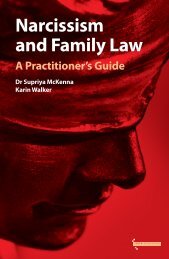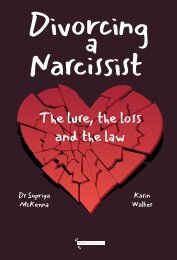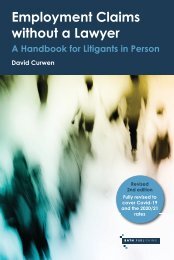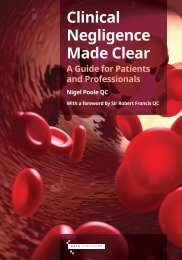Insolvency Made Clear: A Guide for Debtors
Plain English, practical guidance for anyone facing demands over a debt they are struggling to pay.
Plain English, practical guidance for anyone facing demands over a debt they are struggling to pay.
Create successful ePaper yourself
Turn your PDF publications into a flip-book with our unique Google optimized e-Paper software.
Effect Of Bankruptcy<br />
‘privileged’. The protection of privileged material applies to the spouse of the<br />
bankrupt, or anyone else who is required to undergo a private examination. It<br />
does not apply to the bankrupt when asked a question by the Trustee or <strong>for</strong> documents<br />
they possess. However, the Trustee cannot then disclose the privileged<br />
in<strong>for</strong>mation to third parties. Two exceptions to the rule that the Trustee is entitled<br />
to know the bankrupt’s privileged in<strong>for</strong>mation are where a) the advice has<br />
no relevance to the bankrupt’s estate (<strong>for</strong> example, it relates to custody of children),<br />
or b) the advice is about a possible claim against the Trustee themselves.<br />
Under either examination, the court can order HMRC to disclose their tax records<br />
or correspondence with the bankrupt under s369 <strong>for</strong> the purposes of the<br />
examination. This is another blocked avenue <strong>for</strong> a bankrupt who wishes to hide<br />
behind their ignorance of their financial affairs.<br />
Box 10:<br />
BANKRUPTCY OFFENCES<br />
A Trustee in Bankruptcy may find evidence that the bankrupt has<br />
committed a criminal offence. For details, see Chapter 7. The Trustee<br />
in Bankruptcy will not be the prosecutor. Instead, if the Trustee suspects<br />
an offence has been committed, they will report it to the <strong>Insolvency</strong><br />
Service. The <strong>Insolvency</strong> Service will decide whether to <strong>for</strong>ward<br />
the case onto prosecutors.<br />
A Trustee who considers that the bankrupt has not been <strong>for</strong>thcoming with in<strong>for</strong>mation<br />
is likely to apply <strong>for</strong> a suspension of the automatic discharge of the<br />
bankruptcy: see Chapter 9. This will allow them more time to complete their<br />
investigation.<br />
2.17 Length of bankruptcy and effect of discharge<br />
The typical length of bankruptcy is a year from the date where the order was<br />
made (s279 of the Act). Discharge will happen automatically unless the bankruptcy<br />
has been extended (see Paragraph 9.1 <strong>for</strong> when that can happen). After<br />
the bankruptcy is discharged, in most cases the individual is released from the<br />
bankruptcy restrictions and is not obliged to pay any debt which they owed<br />
be<strong>for</strong>e the bankruptcy. The slate is wiped clean. Discharge also removes future<br />
debts which the bankrupt was going to owe at the date of the presentation of<br />
the petition, and contingent debts which they might have owed if certain other<br />
events occurred. It also includes potential claims which could have been brought<br />
be<strong>for</strong>e the bankruptcy order, but were not.<br />
However, the discharge does not release the bankrupt from:<br />
37



